Best Juvenile Law Lawyers in Huai Khwang
Share your needs with us, get contacted by law firms.
Free. Takes 2 min.
List of the best lawyers in Huai Khwang, Thailand
About Juvenile Law in Huai Khwang, Thailand
Juvenile Law in Huai Khwang, Thailand, is a distinct area of the legal system designed to address issues involving minors, typically those under the age of 18. The legal framework focuses not only on the accountability of minors for their actions but also emphasizes rehabilitation, education, and protecting the rights of young people. In Huai Khwang, as throughout Thailand, special courts and procedures are dedicated to handling juvenile cases with an emphasis on privacy, care, and the child’s best interests.
Why You May Need a Lawyer
There are numerous situations where having a lawyer experienced in Juvenile Law is essential. If a minor is accused of committing a criminal offense, legal representation is crucial to ensure their rights are protected throughout the investigation and trial process. Other common reasons include issues involving child custody, status offenses (like truancy or running away), abuse or neglect investigations, disputes with government social services, and issues regarding school discipline. Lawyers can help navigate the complex procedures, represent minors in court, negotiate with authorities, and seek alternatives to detention or harsh penalties. They also provide guidance to families coping with the emotional and practical challenges of such cases.
Local Laws Overview
In Huai Khwang, the legal standards for juveniles are governed by national laws such as the Juvenile and Family Court Act. Key aspects include the separation of juvenile cases from adult cases, confidentiality of juvenile proceedings, and the prioritization of rehabilitation over punishment. Minors have the right to legal representation and the presence of a guardian during questioning. Arresting a minor requires special procedures, and bail or alternatives to detention are commonly considered. In family law matters, such as custody or guardianship disputes, the Family Court focuses on the child’s welfare above all else. Juvenile offenders may be subject to counseling, community service, or educational programs rather than incarceration, depending on the circumstances.
Frequently Asked Questions
What qualifies as a juvenile under Thai law?
A juvenile is anyone under the age of 18 at the time of committing an alleged offense or at the time of legal proceedings.
What types of offenses are considered under Juvenile Law?
Both criminal offenses (theft, assault, etc.) and status offenses (such as truancy, running away, or violating curfew) fall under Juvenile Law.
Are juvenile proceedings public?
No. Juvenile court proceedings in Huai Khwang are typically private to protect the child’s identity and best interests.
Do minors have legal rights when questioned by police?
Yes. Minors have the right to have a guardian and a lawyer present during police questioning, and the questioning must follow special child-appropriate procedures.
Can a minor be detained before trial?
Detention is possible but only after judicial consideration. Alternatives to detention, such as bail, supervision, or placement with a suitable guardian, are often preferred.
What penalties can a juvenile face if found guilty?
Penalties may include counseling, community service, probation, or participation in educational programs. Imprisonment is generally a last resort.
Can juvenile cases be expunged from records?
Certain juvenile records may be confidential and not accessible to the public. Expungement depends on the severity of the offense and court rulings.
What if a minor is involved in family issues like custody disputes?
The Family Court will always prioritize the welfare of the child and may appoint a guardian ad litem or social worker to represent the child’s interests.
Are there support services for juveniles in legal trouble?
Yes. Social workers, psychologists, and representatives from the Ministry of Social Development and Human Security are often involved in cases to provide support and rehabilitation options.
How can families find a qualified Juvenile Law lawyer in Huai Khwang?
Families can contact the local Bar Association, the Juvenile and Family Court, or legal aid centers for referrals to qualified juvenile law practitioners.
Additional Resources
When seeking help or guidance regarding Juvenile Law in Huai Khwang, the following resources can be valuable:
- Juvenile and Family Court in Bangkok - for handling all legal proceedings involving minors
- Ministry of Social Development and Human Security - for social services and support related to child welfare
- Huai Khwang District Office - for information on local procedures and relevant contacts
- Legal Aid Centers - nonprofit organizations and university law clinics offering free or low-cost legal advice
- Royal Thai Police - Children and Women Protection Unit - for reporting abuse or seeking police intervention in emergencies
Next Steps
If you or a minor in your care is facing legal issues involving Juvenile Law in Huai Khwang, the following steps are recommended:
- Consult with a specialized Juvenile Law lawyer as soon as possible to understand your rights and responsibilities
- Gather all documentation related to the case, including police reports, court notices, and personal identification
- Contact the Juvenile and Family Court for procedural information and possible mediation or counseling services
- Utilize support services from government agencies and local organizations dedicated to child welfare
- Attend all legal proceedings promptly and comply with court orders or recommendations for rehabilitation and education programs
Acting quickly ensures the best possible outcome for the minor and helps protect their future opportunities and wellbeing.
Lawzana helps you find the best lawyers and law firms in Huai Khwang through a curated and pre-screened list of qualified legal professionals. Our platform offers rankings and detailed profiles of attorneys and law firms, allowing you to compare based on practice areas, including Juvenile Law, experience, and client feedback.
Each profile includes a description of the firm's areas of practice, client reviews, team members and partners, year of establishment, spoken languages, office locations, contact information, social media presence, and any published articles or resources. Most firms on our platform speak English and are experienced in both local and international legal matters.
Get a quote from top-rated law firms in Huai Khwang, Thailand — quickly, securely, and without unnecessary hassle.
Disclaimer:
The information provided on this page is for general informational purposes only and does not constitute legal advice. While we strive to ensure the accuracy and relevance of the content, legal information may change over time, and interpretations of the law can vary. You should always consult with a qualified legal professional for advice specific to your situation.
We disclaim all liability for actions taken or not taken based on the content of this page. If you believe any information is incorrect or outdated, please contact us, and we will review and update it where appropriate.









